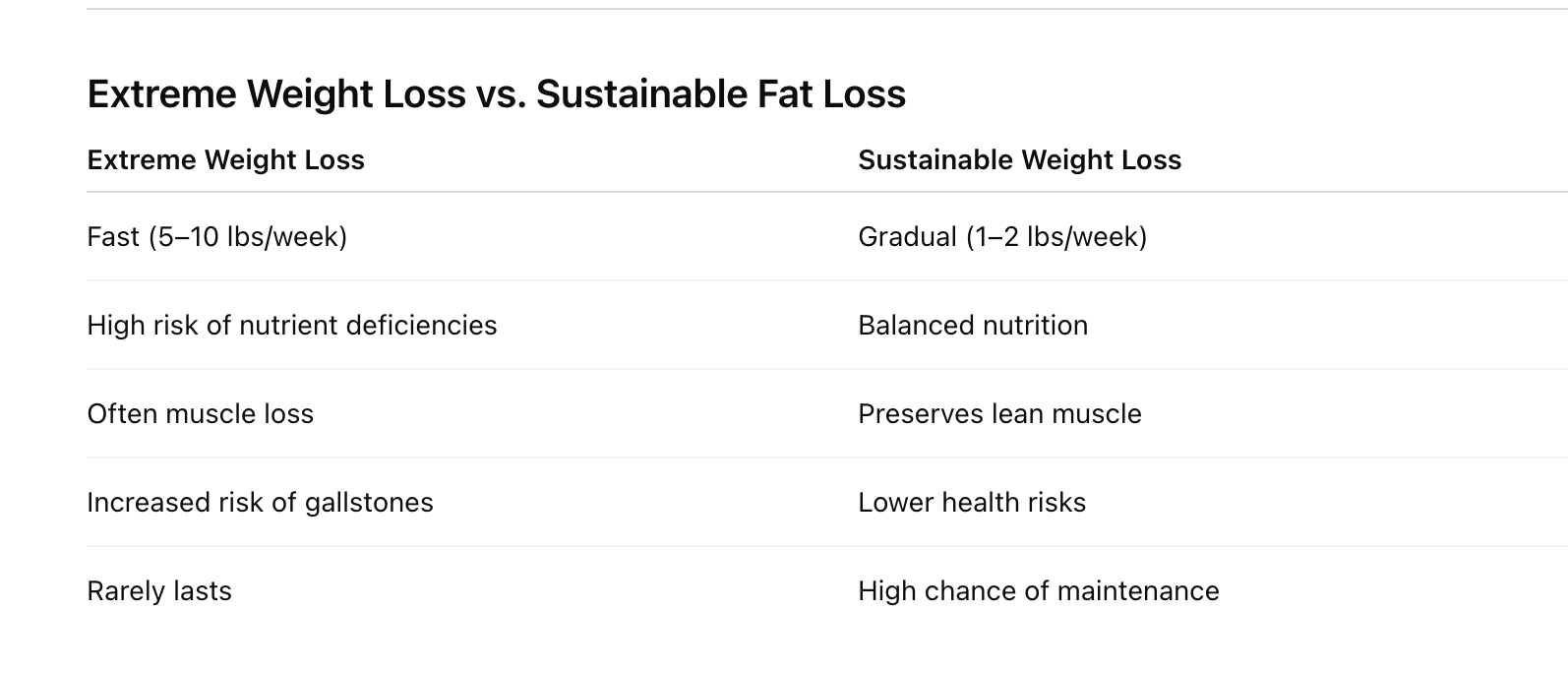What Does Extreme Weight Loss Really Mean?
In medical terms, extreme weight loss often refers to losing more than 10% of your body weight within six months, or dropping 5–10 pounds per week through aggressive methods. This could involve severe calorie restriction, punishing exercise routines, or unmonitored use of weight loss drugs.
While the number on the scale may fall quickly, the underlying effects on your body can be far more complex—and sometimes dangerous.
As physicians often explain, rapid weight loss is not the same as healthy weight loss. The body has built-in mechanisms to protect itself from starvation, and pushing past those limits can trigger serious complications.
Common Methods People Try for Extreme Weight Loss
1. Crash Diets
These are very low-calorie diets (VLCDs), sometimes restricting intake to under 800 calories per day. They can cause fast results, but nearly always at the expense of essential nutrients. As we’ve seen in cases of long-term crash dieting, patients often develop gallstones, brittle nails, and weakened immune systems.
For a deeper dive into why these diets fail, read: Why Crash Diets Fail: The Science of Metabolism.
2. Excessive Exercise
Overexercising—such as doubling workouts or spending hours running daily—can feel productive at first. However, without proper fueling, this leads to muscle breakdown, hormonal disruption, and even heart strain. The body interprets it as physical stress rather than a sustainable fitness plan.
3. Fad Diets
Juice cleanses, detox teas, and “cabbage soup diets” all promise extreme weight loss, but the majority of the pounds lost are water weight and lean tissue, not fat. These diets rarely help maintain results.
4. Prescription Medications and Surgery
In some cases, doctors may prescribe medications like GLP-1 agonists or recommend bariatric surgery. While these interventions can result in dramatic weight loss, they must always be monitored professionally. Read more in: Safe Alternatives to GLP-1 Medications.
The Hidden Dangers of Extreme Weight Loss
Extreme approaches often come with a long list of side effects that patients may not anticipate.
- Metabolic Slowdown – Rapid restriction teaches your body to conserve energy, making future weight loss harder.
- Muscle Wasting – Without protein and strength training, the body burns muscle for energy.
- Nutrient Deficiencies – Extreme diets are usually deficient in iron, vitamin B12, and calcium.
- Gallstones – Losing more than 3 pounds per week increases gallstone risk dramatically.
- Hormonal Disruption – In women, menstrual cycles can be affected; in men, testosterone can drop.
- Mental Health Issues – Studies link extreme dieting to higher rates of eating disorders, depression, and rebound weight gain.
What Science Says About Safer Fat Loss
Doctors and scientists consistently agree: 1–2 pounds per week is the safest and most effective pace for weight loss. While it may feel slow, this rate allows the body to adjust and prevents the severe side effects associated with extreme weight loss.
Core Principles of Safe Weight Loss
- Moderate Calorie Reduction
A daily deficit of 500–750 calories is enough to trigger fat loss without harming your metabolism. - Prioritize Protein
High-protein diets (20–30% of total calories) preserve muscle mass and increase satiety. - Strength Training & Cardio
Combining resistance training with moderate cardio keeps your metabolism strong and promotes fat loss instead of muscle loss. - Sleep and Stress
Poor sleep and high stress elevate cortisol, a hormone that promotes fat storage. See: The Role of Sleep in Sustainable Weight Loss. - Behavioral and Neurological Approaches
Neuroscience shows that habits, not willpower, dictate long-term outcomes. Learning to rewire cravings and food behaviors is critical. To understand more, see: The Neuroscience Behind Lasting Weight Loss.
Expert Insight from Oneleaf
Eliott Cohen Skalli, CEO & Founder at Oneleaf, emphasizes that the brain is the true driver of weight loss:
“Extreme weight loss promises quick results, but it rarely leads to long-term success. At Oneleaf, we focus on retraining the brain so that healthier choices become automatic, making weight loss natural and sustainable.”
This philosophy aligns with the latest neuroscience research, which highlights that lasting weight loss comes from building new neural pathways around food, exercise, and self-control.
Extreme Weight Loss vs. Sustainable Fat Loss

The comparison is clear: extreme methods deliver short-term wins but rarely last, while steady approaches build resilience and health.
Addressing the Psychological Side
Extreme weight loss often ignores the psychological factors behind eating habits. Stress, emotional triggers, and subconscious patterns can derail even the strictest plan.
New research in behavioral science shows that targeting these mental factors can make weight loss more effective. Learn more in: How Stress Affects Weight Gain and Loss.
Final Thoughts
Extreme weight loss can be tempting, especially when fast results are promised. But the risks—nutritional, physical, and psychological—are significant.
If your goal is to lose weight and keep it off, the science is clear: gradual, sustainable methods are safer and more effective. By focusing on neuroscience, balanced nutrition, and sustainable routines, you can achieve your goals without sacrificing your health.
















